The Greatest Monologues In TV History
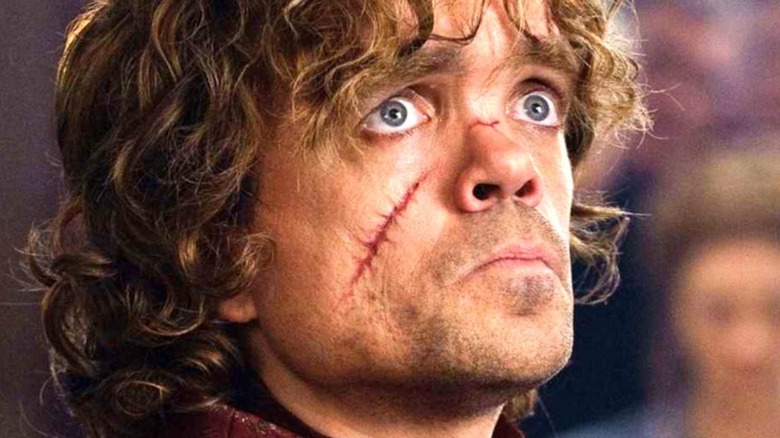
Filmmaking is perhaps the most collaborative art form there is. To achieve even the most minimalistic look, dozens of departments must coordinate their efforts in support of a single vision. As a result, each department is critical and significant. However, if you had to pick one department that is undoubtedly the most important, it would have to be the actors. They are the people shown on the posters. Fans flock to new releases because of them. Even the most talented directors and producers would concede that a good casting choice is half the job done. And there's no better way for an actor to demonstrate their skills than with a stunning monologue.
Typically, the focus of excellent monologues is justifiably on films . However, television has recently caught up to the big screen, not only in terms of impact but also in terms of attracting renowned actors who can do justice to monologues. And because television is a medium for writers, TV monologues aren't just used to showcase an actor's talent. Instead, they can be utilized to state the overarching theme, deliver an unexpected plot twist, or even pass a political message. As such, a great monologue can elevate a television show to another level. Here are some of the best TV monologues of all time.

Breaking Bad: I am the one who knocks
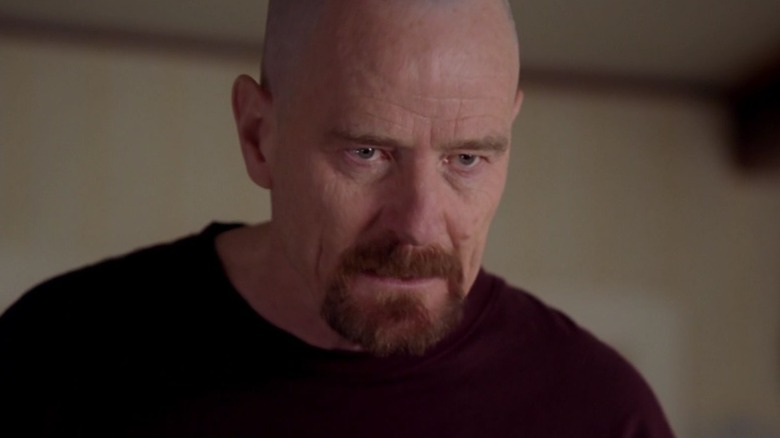
" Breaking Bad " is undoubtedly one of the best TV shows ever created, but it took a while to get going. When it originally aired, critics recognized it as a good show, but it hadn't really permeated the cultural zeitgeist. When the writers began gradually revealing to audiences that Walter White was not a victim attempting to reclaim lost glory, but a bad guy on the rise, the show became the cultural behemoth that it is today.
The Season 4 episode "Cornered" best depicts Walter's spiral toward villainy. Up until this point, the audience is still hopeful that Walter can achieve salvation. When Walter unintentionally makes himself a target of the DEA, his wife echoes these sentiments, advising him to surrender. Instead, he scolds her, telling her that he is not in danger, but rather that he is the danger . He adds: "A guy opens his door and gets shot and you think that of me? No. I am the one who knocks."
Walter is also speaking to the audience here, informing them that he's gone from downtrodden protagonist to ruthless villain. Even those who have never seen "Breaking Bad" have probably heard of this iconic monologue, demonstrating how ingrained in pop culture the show is.
Ted Lasso: Be curious, not judgmental
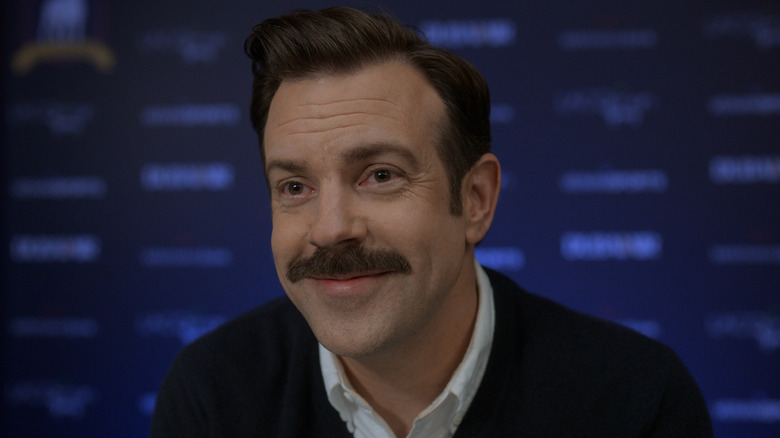
What began as a series of lighthearted commercials for NBC's coverage of the English Premier League somehow turned into an Emmy Award-winning dramatic comedy. "Ted Lasso" is the story of an American college football coach who is hired to manage a soccer team in England. He is expected to fail, but becomes a success against all odds. On the surface, it doesn't appear to be the kind of show that would contain a memorable TV monologue. But, like the titular coach, this Apple TV+ series is full of surprises.
In one memorable scene set in a typically English pub, Ted hustles the obnoxious ex-husband of Richmond AFC's owner, Rebecca Welton. Ted suggests a wager: If Rupert beats him at darts he can pick the team for the last two games of the season, but if he loses, he has to stay away from the owners box as long as Rebecca remains in charge. Rupert, assuming that Ted is useless at darts, agrees. Ted delivers a moving monologue as he defeats Rupert.
"Guys have underestimated me my entire life and for years I never understood why — it used to really bother me," he says as the whole pub watches on. "Then one day I was driving my little boy to school, and I saw a quote by Walt Whitman, it was painted on the wall there and it said, 'Be curious, not judgmental.' I like that." Had Rupert been curious and asked Ted about his darts experience he wouldn't have lost. The scene undoubtedly contributed to Jason Sudeikis winning his Emmy .
The Fresh Prince of Bel-Air: How come he don't want me, man?
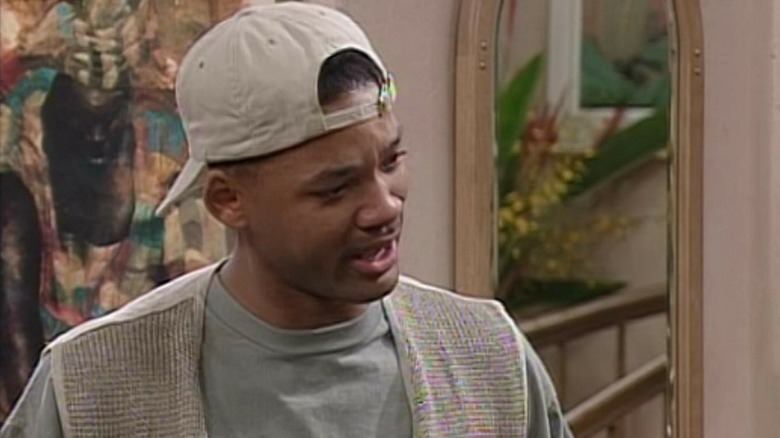
Will Smith's performances in the early seasons of "The Fresh Prince of Bel-Air" were famously shaky — if you look closely you'll notice him mouthing the lines of his co-stars as he finds his feet. However, Smith had gained some confidence by the time the fourth season episode "Papa's Got a Brand New Excuse" was shot. In the episode, Will's absent father shows up — only to abandon him again.
Smith was asked to perform a dramatic monologue, which he had never done previously. He struggled at first but eventually delivered one of the most sincere and impactful performances of his career. "I'll be a better father than he ever was, and I sure as hell don't need him for that, 'cause ain't a damn thing he could ever teach me about how to love my kids!" he tells Uncle Phil before he breaks down and starts to cry, adding the now iconic line: "How come he don't want me, man?"
Smith later credited James Avery (Uncle Phil) with helping him get through the scene. He told TIDAL's Rap Radar Podcast (via Cheat Sheet ): "I'm messing up the lines 'cause I want it so bad and I'm in front of the audience and I'm doing it and I'm furious and he holds on to me and he says, 'Hey, relax. Relax. It's already in there. You know what it is... Look at me. Use me. Don't act around me. Act with me.'"
The Newsroom: America is not the greatest country in the world anymore
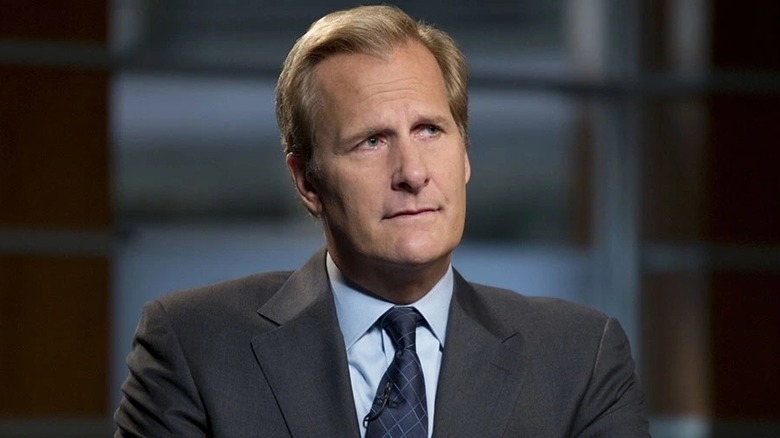
A list of the best TV monologues would be incomplete without an Aaron Sorkin show somewhere in the mix. His outlook on American politics has gained him acclaim from critics and fans alike. His first foray into American political discourse was on "The West Wing," but he truly mastered the craft on his later show "The Newsroom." Set at a New York cable news network, the show focuses on the channel's top anchor, Will McAvoy (Jeff Daniels). It is centered on Will becoming disillusioned with the way his country and career are handled.
All of this is summed up in the first episode's first scene. Will McAvoy is at a conference, and a lady from the audience asks him why America is the best country in the world. Will initially attempts to sidestep the question, but when he finally responds, it's explosive . "There is absolutely no evidence to support the statement that we're the greatest country in the world," he says. "It sure used to be. We stood up for what was right. We fought for moral reasons. We passed laws, struck down laws — for moral reasons. We waged wars on poverty, not on poor people. We sacrificed, we cared about our neighbors, we put our money where our mouths were and we never beat our chest. [...] America is not the greatest country in the world anymore."
Speaking to The Hollywood Reporter about the show, Daniels said that this monologue saved his career. "That was the speech I had been waiting 35 years to do," he said.
Scandal: You have to be twice as good to get half of what they have
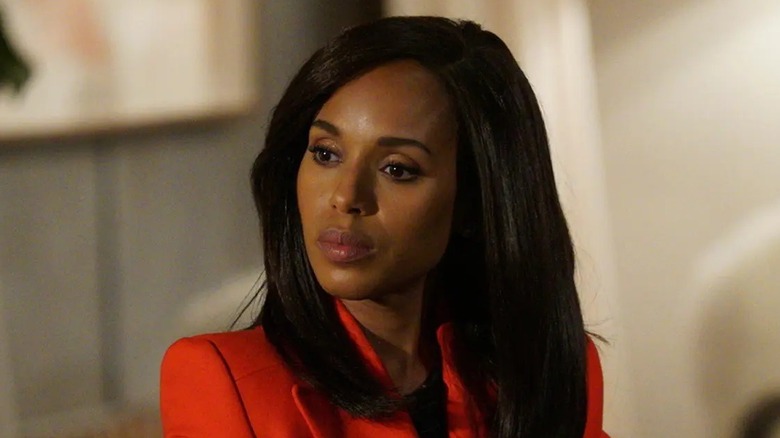
When Olivia Pope (Kerry Washington) is exposed as the president's mistress in Shonda Rhimes' "Scandal," her father Rowan Pope (Joe Morton) offers her refuge by transporting her out of the country, where she won't be defined by the affair. But, before he does, he lectures her on how he raised her better than to have affairs with powerful men. "How many times have I told you, 'You have to be' — what?" Olivia responds with "Twice as good," and her father's rant continues . "Twice as good as them to get half of what they have. Sleeping with that... For God's sake! You know to aim higher!"
The monologue became a reminder and a motto that things will always be a little more difficult for people of color. The scene "really resonated with African-Americans," Kerry Washington told Entertainment Weekly . "It's this idea you have to be twice as good to get half of what they have. It's something that most Black people I talk, when they heard that line, it completely resonated with how they were raised and the messaged their parents gave them."
Veep: You are the worst thing that has happened to America since food in buckets
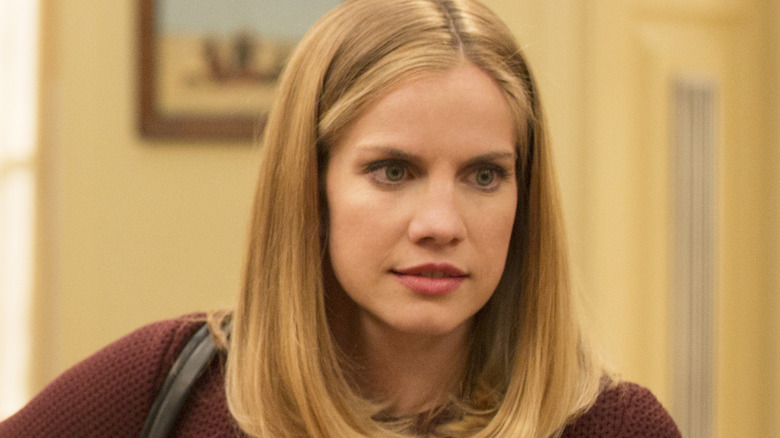
" Veep " is an HBO political comedy that balances workplace humor with truly incisive political analysis. Beyond its crude yet witty dialogue, the show's brilliance resides in the way it portrays politics as a game played by narcissists with real-world repercussions. Julia Louis-Dreyfus is the star of "Veep," and her deadpan delivery of the most scathing barbs keeps the audience laughing out loud with her throughout her machiavellian plots. However, the show's secret weapon is that it's essentially an ensemble piece.
Many of the most memorable lines are delivered by members of the supporting cast, like when Amy (Anna Chlumsky) snaps and decides that she's had enough of Selina (Louis-Dreyfus). "You have two settings — no decision and bad decision," Amy says . "I wouldn't let you run a bath without the Coast Guard and the fire department standing by, but here you are running the country. You are the worst thing that has happened to America since food in buckets." There's a catharsis in finally seeing Selina blasted for all the turmoil she causes, considering she's frequently the one grinding her staff for little mistakes.
Bojack Horseman: She just wanted what we all want — to be seen
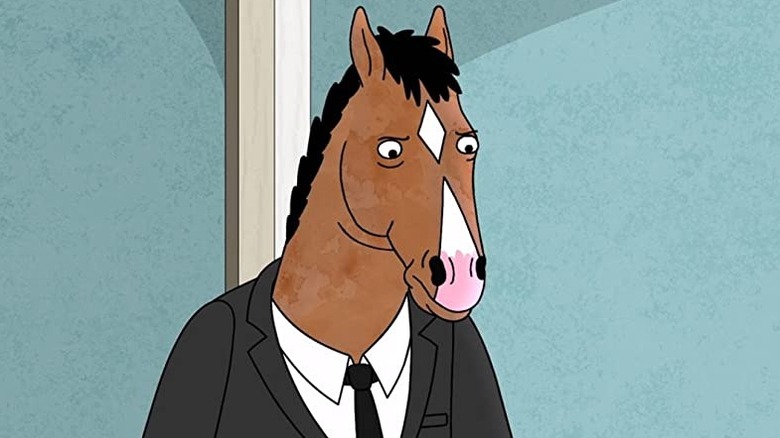
How long can a monologue go on for? When it comes to "Bojack Horseman," the answer is almost an entire episode. The fifth-season entry "Free Churro" consists largely of the main character delivering a eulogy at his mother's funeral. Will Arnett, who voices the titular anthropomorphic horse (a washed up former actor), picked up an Annie Award for the moving episode.
The monologue he gives at his mother's funeral is full of the kind of humor that made the show so popular, but it also cuts deep. "No point beating a dead horse," he says in his closing statement. "Beatrice Horseman was born in 1938, and she died in 2018, and I have no idea what she wanted. Unless she just wanted what we all want — to be seen... Is this Funeral Parlor B?"
Despite receiving near-universal critical acclaim , the cultural influence of "Bojack Horseman" is criminally modest. To be fair, the show tackles difficult issues that cause viewers to consider the impact of their flaws on their loved ones. At its best, "Bojack Horseman" demonstrated how tough it is to break self-destructive cycles, so it's reasonable if fans watch it and don't feel like making memes about it.
The Bear: He just cut me off cold
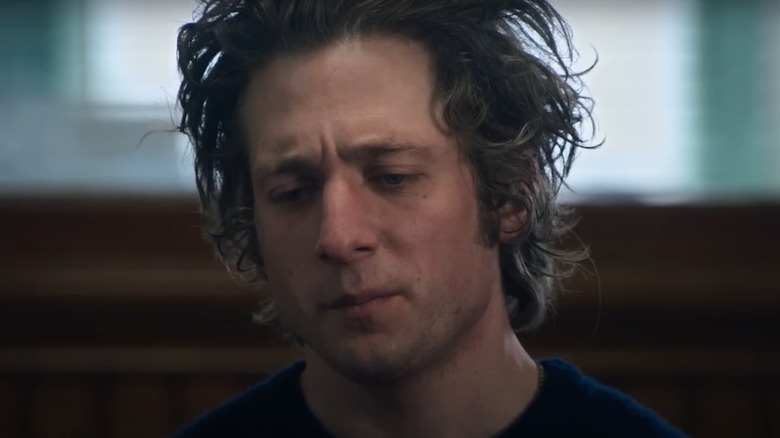
One of 2022's biggest success stories, the FX show "The Bear" follows Carmen "Carmy" Berzatto (Jeremy Allen White), an accomplished chef who leaves the world of fine dining behind to take over his family's sandwich shop in Chicago. His brother, who used to run the place, died by suicide before the events of the show unfold. Carmy doesn't go into his relationship with his late brother much over the first seven episodes, but in the Season 1 finale, he unloads during an Al-Anon session. In the gripping monologue, we discover that Carmy used to be very close with his older brother until he just stopped talking to him one day.
"He just cut me off cold," Carmy says . "And that, um... That hurt, you know? And I think that just, that flipped a switch in me where I was like, 'Okay, f*** you, watch this!' And because we had this connection through food and he had made me feel so rejected and lame and s***** and uncool, I made this plan where I was gonna go work in all the best restaurants in the world." According to White, knowing about the monologue in advance "grounded" him throughout the season. "I would read it most days before work just to start getting it into my head," he told Vanity Fair . "I felt like, on every read, as I was trying to memorize bits and pieces, it was helping me understand Carmy in a different way."
Mad Men: This device isn't a spaceship, it's a time machine
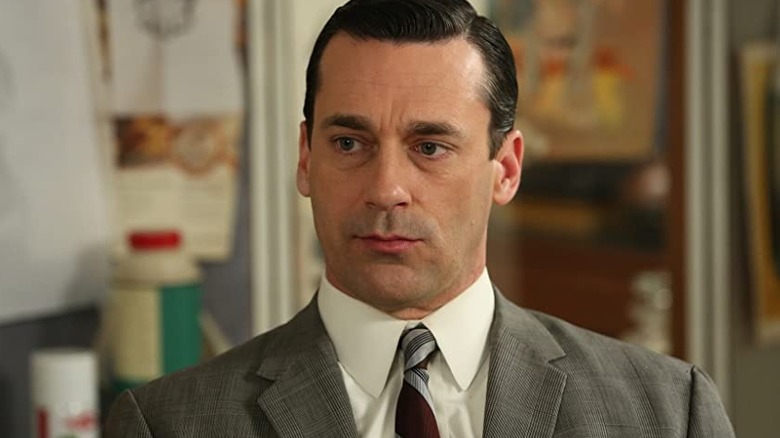
Set in the mid-20th century, AMC's "Mad Men" follows advertising executive Don Draper (Jon Hamm), a magnetic character based on several real-life advertising execs . The show frequently investigates the idea of perception versus reality. Draper is a severely damaged individual, but he puts on a front to advance in his profession.
Part of what makes the show so brilliant is that it never shies away from being subtle, even if that means being opaque at times. This technique led to some of the most rewarding sequences in the history of the show. Perhaps the best example of this is the Season 1 finale "The Wheel." Kodak is attempting to market a new method for viewing images, and Draper delivers a monologue that is clearly alluding to his personal life as much as it is the product.
"In Greek, 'nostalgia' literally means 'the pain from an old wound,'" he says as he flicks through old pictures of his family. "It's a twinge in your heart far more powerful than memory alone. This device isn't a spaceship, it's a time machine. It goes backwards, forwards, takes us to a place where we ache to go again. It's not called the wheel. It's called the carousel. It lets us travel the way a child travels. Round and around, and back home again, to a place where we know we are loved."
Game of Thrones: I wish I was the monster you think I am
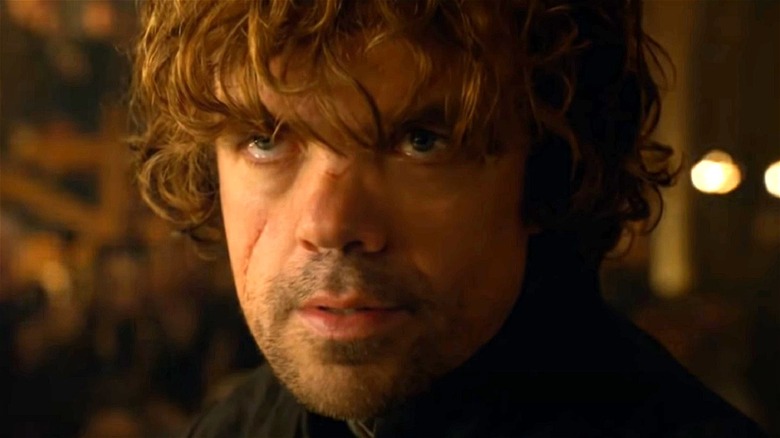
Monologues are often used to signal the conclusion of an arc. The nature of them makes them perfect for showing the audience that a character has eventually come to terms with something that viewers have known all along. It could be someone's destiny finally being fulfilled. Such is the situation when Tyrion Lannister (Peter Dinklage) realizes during his nephew's murder trial that his family will always despise him simply because he was born different.
In the "Game of Thrones" episode "The Laws of Gods and Men," Tyrion stands accused of murdering King Joffrey. He's innocent, but he knows he won't get a fair trial — his father and sister hate his guts. His brother Jaime (the only family member who ever cared for him) begs him to plead guilty and ask to join the Night's Watch. Instead, Tyrion delivers the most memorable monologue in the history of the HBO hit. "Yes, father. I'm guilty. Guilty. Is that what you want to hear?" When his father, Tywin Lannister, replies with, "You admit you poisoned the king?," Tyrion clarifies what he meant. "No, of that I'm innocent. I am guilty of a far more monstrous crime. I am guilty of being a dwarf."
The power of balance in the scene turns here, and it's down to the performance of Dinklage. "I wish I was the monster you think I am," Tyrion says to the gathered masses. "I wish I had enough poison for the whole pack of you! I would gladly give my life to watch you all swallow it!" The actor won four Emmys for his work on "Game of Thrones," and this monologue is a reminder of why his turn on the show was so celebrated.
Succession: My father is a malignant presence
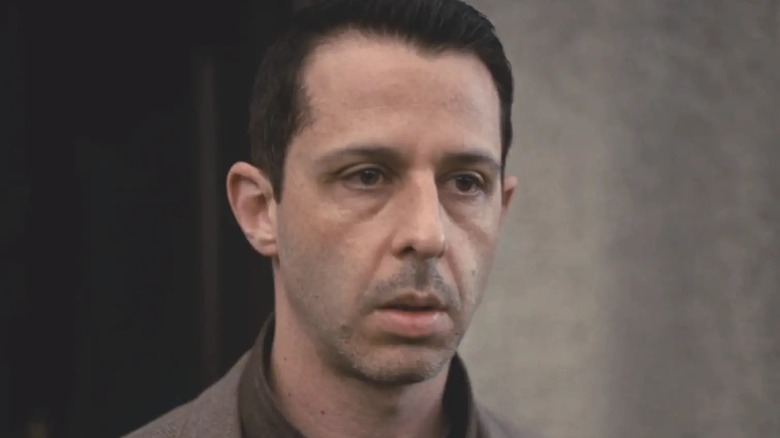
The success of HBO's "Succession" is no surprise. People love to see how the 1% live, and this show satisfies that thirst by following an aging mogul as he decides which of his offspring will take over his media empire. It is Shakespearean not only because it derives its main premise from "King Lear," but also because of its use of language. Every single phrase spoken by the major characters in "Succession" is designed to manipulate. Patriarch Logan Roy (Brian Cox) believes that to get ahead, you must use speech to mislead people and eventually destroy them. This is a skill that he thinks his heir apparent Kendall Roy (Jeremy Strong) lacks.
In the Season 2 finale, the show plays on this to fool the audience. Logan is dealing with his largest controversy yet, and he offers up his son to the media as a scapegoat. Kendall says he will play ball, but he goes ahead and speaks the truth : "I have been asked to explain my own role in the managing of illegality at the firm and associated coverups. And it has been suggested I would be a suitable figure to absorb the anger and concern. But. The truth is that my father is a malignant presence, a bully, and a liar, and he was fully personally aware of these events for many years and made efforts to hide and cover up." The plot twist is one of the most remarkable in recent memory.
Twilight Zone: Logic is an enemy and truth is a menace
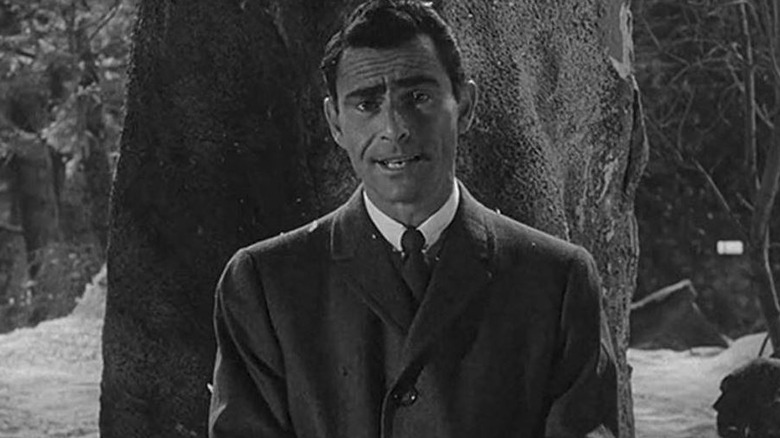
"The Twilight Zone" creator Rod Serling delivered plenty of great opening monologues on the show, but perhaps the most memorable of the bunch is the one that kicks off "The Obsolete Man." This Season 2 episode takes place in a totalitarian society. It follows a librarian to court in a minimalistic set with only an overlong table and a dramatically tall stand for the judge, aptly named the chancellor. According to the chancellor, neither books nor the librarian's faith has any more space in their state. As a result, the chancellor sentences the librarian to death, claiming that the librarian is obsolete.
As the doomed librarian enters the courtroom at the beginning of the episode, Serling delivers a chilling monologue about tolerance and dictatorship. "This is not a new world, it is simply an extension of what began in the old one," he states. "It has patterned itself after every dictator who has ever planted the ripping imprint of a boot on the pages of history since the beginning of time. It has refinements, technological advances, and a more sophisticated approach to the destruction of human freedom. But like every one of the super states that preceded it, it has one iron rule: Logic is an enemy and truth is a menace."
Serling's memorable monologue remains as relevant today as it was back in 1961, when the episode first aired. It was sampled by Run The Jewels in their 2016 track "Thieves! (Screamed the Ghost)."
Fleabag: Why am I still scared?
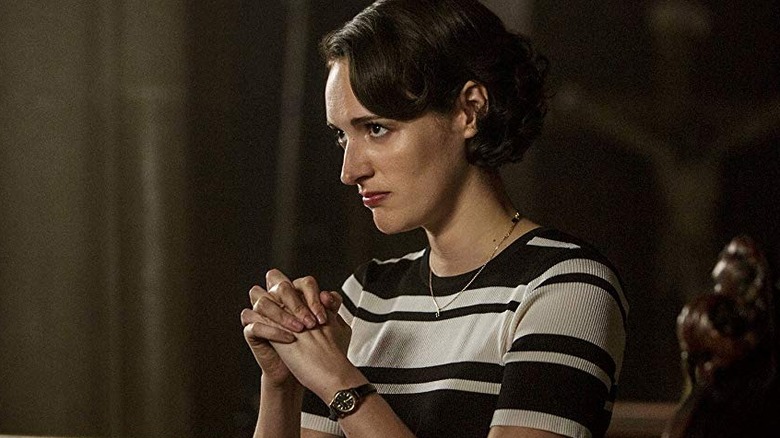
Monologues are a great way of portraying vulnerability. Given that " Fleabag " began as a one-woman stage production , this came naturally to Phoebe Waller-Bridge. The show follows a British millennial as she navigates adulthood, with the comedy stemming from her self-deprecating humor. Her life changes when she encounters a priest who appears to notice when she is engrossed in her thoughts. Fleabag begins to trust him in ways she has never trusted anyone else as they spend more and more time together. She eventually trusts him enough to tell him how she longs for love, is afraid she won't find it, and believes she doesn't deserve it.
"I just think I want someone to tell me how to live my life, Father, because so far I think I've been getting it wrong, and I know that's why people want people like you in their lives, because you just tell them how to do it," she drunkenly tells the priest from her side of the confessional booth. "You just tell them what to do and what they'll get out at the end of it, and even though I don't believe your bulls***, and I know that scientifically nothing I do makes any difference in the end anyway. I'm still scared. Why am I still scared?" Both the writing and the performance are excellent. "Fleabag" is a show that defines a generation, and this sequence is a standout.
The Good Place: Picture a wave in the ocean
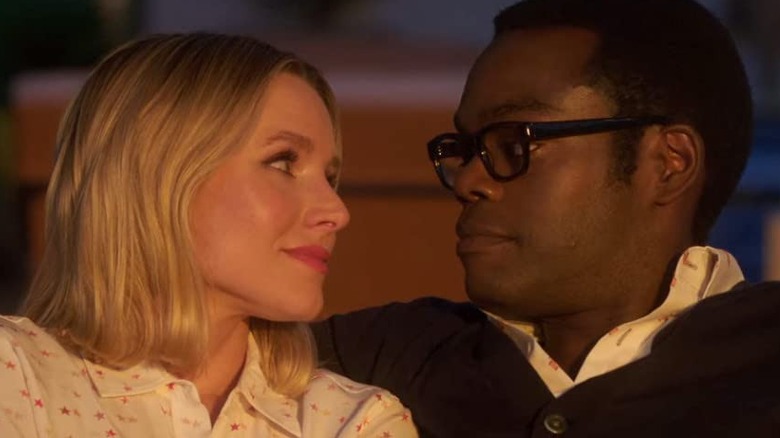
What better way to bring a long-running series to a close than with a monologue that gives viewers closure? " The Good Place " was a standout show that explored the idea of what it means to be a good person and all that stands in the way of viewers accomplishing that goal. The show is funnier than it has any right to be, given the premise, and the chemistry between the two leads, Kristen Bell (Eleanor) and William Jackson Harper (Chidi), always felt fresh. It was difficult to see how the writers could possibly wrap up the plot given the show's numerous time jumps and the multidimensional setting. When the time came, Chidi delivered a beautiful message on time and closure .
"Picture a wave in the ocean," Chidi tells Eleanor in the series finale. "You can see it, measure it — its height, the way the sunlight refracts when it passes through. It's there and you can see it and you know what it is. It's a wave. And then it crashes on the shore, and it's gone. But the water is still there. The wave was just a different way for the water to be, for a little while. That's one conception of death for a Buddhist. The wave returns to the ocean — where it came from, and where it's supposed to be." It's both wise and heartwarming, and a great capper on the show. Monologues can take numerous shapes, and the most impressive ones do more than merely call attention to themselves. The substance will always trump the style.
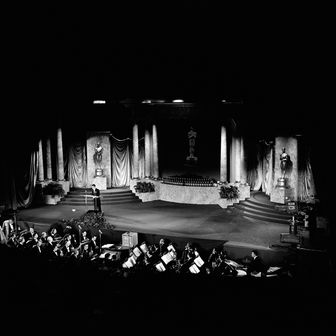
Things you buy through our links may earn Vox Media a commission.
The 50 Greatest Awards-Show Speeches of the Last 55 Years
The best acceptance moments make or break careers, cement fandoms, and spark blind items..
This article was featured in One Great Story , New York ’s reading recommendation newsletter. Sign up here to get it nightly.
The entire room was holding its collective breath when Olivia Colman beat odds-favorite Glenn Close to the Best Actress Oscar in 2019. Close had long been expected to win the season’s biggest prize for her performance in The Wife — a movie in which she plays the wife of all wives — having already taken home the Golden Globe for Best Actress in a Drama and other precursor awards. Colman also won a Golden Globe that year, for Best Actress in a Musical or Comedy , for her part as the gouty, manipulated Queen Anne in The Favourite , and her tipsy speech (in which she thanked her “bitches” and extolled private jets) fortified what prognosticators already thought: Colman was funny, but Close was the serious winner. Until she wasn’t. In the face of such upset, what would Colman say?
Looking out onto a crowd she didn’t expect to face, Colman reached for the truth: to win, she said, is “ genuinely quite stressful ,” before admitting, through gasps and tears, it’s also “hilarious.” It’s an accurate two-part description of the general allure of awards shows, which can present moments both laughable and genuinely thrilling. We anticipate the Oscars and its kindred ceremonies for their red carpets and host monologues and cinematic montages and the times when Queen Latifah sings something, but we endure the hours-long award-show broadcasts for the psychic whiplash of acceptance speeches, when the polished Hollywood stars we admire are caught earnestly surprised, gracious, or moved to tears — or, just as captivating, when they perform surprise, gratitude, and deeply felt emotion and make it all seem genuine. Even the most choreographed of speeches embrace the power of pure spectacle, becoming windows into souls that are, at their core, either deeply beholden to the people who helped them along the way or deeply vengeful toward the people who didn’t help them along the way. Some of the best read like blind items forming live on our TV screens.
Back at the Oscars, Colman eventually composed herself and delivered a heartfelt and perfectly meandering ode to Close, Colman’s kids, her husband of 25 years, her agent, little girls practicing speeches in front of the telly, some people at Fox, Yorgos Lanthimos and her aforementioned “bitches” castmates, and, for no apparent reason other than she’s sitting in the front row of the audience, Lady Gaga — every appreciation customized for the subject and punctuated by genuine physical outbursts, as though her ecstatic brain was warring with her stunned body. It is a spectacle you can’t peel your eyes from that builds with tension until she blows a kiss to Ally Maine and relinquishes the stage to, as promised, snog anyone she forgot to acknowledge. Like any unforgettable speech giver, she managed to meet the high-stakes moment in which she found herself.
Watching as many acceptance speeches as we have as hosts of a podcast with the name “Oscar” in it , we’ve come to appreciate the specific qualities that separate the merely adequate awards-ceremony speeches (from nearly every male performer) from the truly special ones (from actresses, plus certain ornery old men and at least one rabble-rousing documentarian). The greatest acceptance speeches are enthusiastic like Colman’s without verging into inscrutability (sorry, Roberto Benigni ), though exceptions exist for speeches that are so low energy it’s the gag. They are quotable, with at least one defining line of speech, even if it’s the only line of speech (see Nos. 31 and 23 on this list). Sincerity in a speech is more important than the message; it’s why a baffling but believable reaction to winning an Oscar is cemented in our brains before the ones that are dutifully gracious or that perfunctorily advocate for something beyond the recipient’s own skills. (Although everyone loves a scorched-earth speech — see No. 14 on this list). And, of course, the prestige level of the award show itself matters; a memorable speech at the Oscars can outrank one of the same caliber at the Globes, because the pins-and-needles suspense at the pinnacle of awards season only ups the ante of the viewing experience. At the same time, a precursor speech of lower standing can tip the scales of an Oscar campaign, and we recognized those too. (In the interest of variety, we also only considered one speech per actor per awards cycle; sorry, Colman’s breathy “hi” at the Globes, but her breathy “hi” at the Oscars was better.)
This year, an already dense awards season will see the Emmys wedged in between the Golden Globes and the Academy Awards, so what better time to revisit unforgettable awards-season moments by acknowledging the 50 speeches of the last 55 years? (To be eligible for this list, speeches needed to be archived somewhere online, and the earliest recording here dates back to 1969.) While the Grammys will also be broadcast next month, we’re keeping this ranking to screen and stage awards (the MTV movie awards qualify, but the VMAs do not), where the art of the acceptance speech has been perfected by stars who make a living performing dialogue and the filmmakers and craftspeople who make them look good doing it. (Speeches by below-the-line artists were eligible for this list, but our final 50 ended up favoring the performers of Hollywood.) And remember, this ranking is about speeches , not bits. Winona Ryder mugging behind David Harbour’s SAG Ensemble speech for Stranger Things ? Good meme, beautiful meme, but you won’t see Harbour’s acceptance moment celebrated here.
50. Patti LuPone, 62nd Tony Awards (2008)
Best Performance by an Actress in a Leading Role, Gypsy
The Tony Awards are where we’re most reliably reminded that “Stars, they are not like us. Its recipients are accustomed to not only the spotlight but commanding a theater of people eight times a week. Take, for example, Patti LuPone, who in 2008 won the second of her three Tonys as Mama Rose in a revival of Gypsy . It was her first win in nearly three decades, despite boasting one of the most revered careers in the American theater. With a sense of glory and triumph usually reserved for horn sections, LuPone amended a prepared speech from a previous loss (hilarious!) and trilled through an inventory of thank-yous that spanned multiple theater companies and professionals, up to and including the ghosts of the St. James Theatre. But as one of Broadway’s grand dames, naturally she still comes off as earnest and heartfelt doing it. When the orchestra begins to play over her speech (we’ll have more of those, just wait), she’s affable to it at first, but then she erupts like an ocean squall full of pent-up Tony losses and earned litigiousness toward Andrew Lloyd Webber: “Shut up! It’s been 29 years!”
49. Ben Affleck and Matt Damon, 70th Academy Awards (1998)
Best Screenplay Written Directly for the Screen, Good Will Hunting
Speaking of yelling: Sometimes when you win an award, the Boston jumps out. The otherwise prim quality of an awards ceremony can favor a speech where the winner’s enthusiasm and wide-eyed disbelief are at full volume. Here, Affleck and Damon maintain the composure expected in a ceremony like the Oscars (Affleck even says the words “We’re fortunate enough to be involved with a lot of great people upon whom it’s incumbent upon us to thank”) … before basically ending their speech doing keg stands. Like a pair of brothers with a fancy new toy, their thank-yous get louder, more tangled, more manic. Producers are great! Moms are beautiful! Their hometown is everything! Affleck’s voice eventually cracks and the effusion comes to a halt. They really were just two young guys!
48. Ving Rhames, 55th Golden Globe Awards (1998)
Best Actor — Miniseries or Television Film, Don King: Only in America
Over the years, the Golden Globes has earned a reputation for being the awards show where all the craziest shit happens. And that reputation was probably formed around the time Ving Rhames tried to give his best actor trophy to Jack Lemmon. The entire moment is a generosity battle between two unyielding mensches. First of all, Rhames is endearingly formal in asking “Mr. Jack Lemmon” to emerge from the crowd and take the stage. Lemmon is in a daze as he takes the long route to the stage. Rhames tells Lemmon he’s not going to give him the Globe — so as not to scare him off, then gives Lemmon the award as soon as he arrives at the mic. At this point, Lemmon’s basically playing one of his everyman characters, trying to figure out in real time whether the right thing to do is hand the award back or accept Rhames’s gesture in the spirit in which it was intended. Meanwhile, in the audience, Goldie Hawn is in tears, Jodie Foster is laughing her ass off, and Jack Nicholson is cheekily suggesting Lemmon pass the award to him next. Despite the “you take it, no you take it” tug-of-war that nearly ends with the statue getting dropped, both Rhames and Lemmon ultimately combine for an incredible tandem speech. Rhames brings emotion (the tears come quickly and don’t stop) and the elegance (a Stanislavsky quote). You get the sense that only someone as emotionally open as Rhames would have ever made the gesture, and only someone as seasoned as Lemmon could have rolled with the punch.
47. Susan Lucci, 26th Daytime Emmy Awards (1999)
Outstanding Lead Actress in a Drama Series, All My Children
The occasion of Susan Lucci finally winning a Daytime Emmy after 18 previous nominations failed to result in a statue would have been enough to enshrine this moment in awards-show history. But Lucci went on to deliver a speech worthy of soap opera history, too. After lapping up the absolute pandemonium of the crowd (Rosie O’Donnell weeping; Oprah Winfrey hollering from the wings of the stage) for nearly 90 seconds, smiling, gasping, squealing, and bursting with “I can’t believe it’s,” Lucci eventually thanks the audience, her husband and kids, and the team at All My Children . But she gets into an oratory groove when she mentions that she was originally seen by casting directors as merely an “ethnic type,” only good enough to appear every other Tuesday. Lucci then points to Agnes Nixon, the great matriarch of daytime drama, for “changing the face of our medium” — placing her own struggle for legitimacy in the historical context of soaps’ perpetual uphill climb for industry respect. And she’s right to do so — Lucci’s quest for a long-awaited Daytime Emmy helped legitimize the awards by giving them a level of intrigue every year. And by the end of the speech, she might as well be standing in the middle of Pine Valley’s town square. She’s fully slipped into Erica Kane’s version of magnanimity, standing proudly beneath the stage lights, promising her legions of fans that she’ll be back at work with them on Monday.
46. Lin-Manuel Miranda, 62nd Tony Awards (2008)
Best Original Score, In the Heights
On any list of polarizing figures and acquired tastes in musical theater, there is Lin-Manuel Miranda, whose style of rapping has become as omnipresent at the Tonys as the phrase “the Shubert organization.” It’s easy to find his energy infectious, this fresh young face taking Broadway by storm, the look of awe still there on said face. You could, at the same time, find his schtick cringey, the Wesleyan try-hard pirouetting out as he nods to Thomas Kail “for keepin’ the engine burnin’, for being so discernin’.” But there’s an undeniable energy to his first Tony win as he tremulously freestyled his thank-yous, crescendoing with shout-outs to Stephen Sondheim and Puerto Rico. You need only look at the ensuing years of Tony Awards full of Neil Patrick Harris spitting L.M.M.-penned rhymes at the end of the show to see how this speech resonated.
45. Patty Duke, 22nd Primetime Emmy Awards (1970)
Outstanding Single Performance by an Actress in a Leading Role, My Sweet Charlie
There’s nothing like watching a celebrated performer suck the inflated pomp and circumstance out of a room with their sheer magnetic intensity. Patty Duke does so by taking the stage and making the audience soak in her silence — something you’ll almost never hear during an awards ceremony! Soon after she arrives at the mic, she raises a flattened hand to her brow to wordlessly investigate the audience only to utter the words, “You, Mom. Happy birthday.” (No exclamation point.) The dead air she inserts on either side of an eventual word — “enthusiasm” — turns her minimalist intensity into a fine art. And even as it dips into the slightly bizarre, she never loses our attention.
44. Rue McClanahan, 39th Primetime Emmy Awards (1987)
Outstanding Lead Actress in a Comedy, The Golden Girls
When Ben Affleck won Best Picture for Argo , he said to endure in Hollywood as he had, you can’t hold grudges. But he said it in a way that sounded like he’d very much been holding onto some real grudges. He’d have been better off accepting his Oscar by showing a video of Rue McClanahan’s speech from 1987. After winning for her role on The Golden Girls , McClanahan recalled her mother’s advice that “Every kick’s a boost.” And to the ones who gave her kicks along the way, Rue — eyes darting and narrowing in a genuinely intimidating rhythm, fingers massaging her rings, that Southern voice purring as was her signature sound onscreen — assured them they’d be “in the book.”
43. James Cameron, 70th Academy Awards (1998)
Best Director, Titanic
This is a list of the greatest speeches, though not necessarily the most innately likable ones. James Cameron’s brand of cheerful self-regard, which he carried with him throughout Titanic ’s full-steam-ahead push in the 1997 awards season, wasn’t always the most endearing. But when he capped off his best director win by earnestly quoting his own character, Jack Dawson, with an “I’m the king of the world!” — his howls echoing through the Shrine Auditorium — he was the triumphant auteur incarnate. Sure, he sounded like he was shoving it in the face of all the other movies that got steamrolled by Titanic that year, but if you can’t feel on top of the world when you’re winning an Oscar, when can you?
42. Sharon Stone, 53rd Golden Globe Awards (1996)
Best Actress in a Motion Picture — Drama, Casino
For as much as Sharon Stone got kicked around Hollywood, with everyone from critics to comedians acting like she was some kind of bad actress after Basic Instinct , she’d be forgiven for thinking it a miracle that she’d get this award over the likes of Meryl Streep, Emma Thompson, and the eventual Oscar winner in her category that year, Susan Sarandon. Stone’s speech makes the list for two reasons: first, the pitch-perfect comic timing when Stone, fumbling for how to begin this unlikely acceptance, finally fixes her eyes on the audience and deadpans, “Okay, it’s a miracle.” And the unvarnished yet still appreciative way she thanks people like Martin Scorsese who made “room for the breadth and annoying moments of my uncontrollable passion.” We love candid self-awareness.
41. Steven Soderbergh, 73rd Academy Awards (2001)
Best Director, Traffic
In recent years, as Oscar telecast producers have gotten more stringent about limiting their broadcast’s runtimes, they have used the occasion of the nominees’ luncheon to screen Soderbergh’s 2001 acceptance as an ideal speech. It’s brief (under a minute), it says something meaningful about art, and thanks anybody out there “who spends part of their day creating.” Most importantly, it eschews the laundry list of names that ceremony producers just cannot stand. In general, this ranking endeavors to celebrate exactly the kind of speeches that Oscars producers say they don’t want, but we have to admit, Soderbergh is quite eloquent in his brevity. Here’s to those who create!
40. Marion Cotillard, 80th Academy Awards (2008)
Best Performance by an Actress in a Leading Role, La Vie en Rose
Quick, say “Thank you, love; thank you, life” to the first person you find in an unironic beret and they will surely tell you that it’s true there are some angels in this city. At the 80th Academy Awards ceremony, a then new-to-English and new er -to-awards Cotillard brims with the gratitude and possibility of a child witnessing their first snowfall. You can’t blame her zeal — her performance as Édith Piaf in La Vie en Rose was the first performance in the French language to win a best actress statue, and no one could have predicted her win even after smaller roles in a few American movies. Cotillard was running neck-and-neck with Julie Christie for the win, and clearly Cotillard was taken by surprise to be declared the victor. The triumph blends the best of two awards-speech worlds: profound honesty and accidental quotability. “You rocked my life!”
39. Taraji P. Henson, 23rd Screen Actors Guild Awards (2017)
Outstanding Performance by a Cast in a Motion Picture, Hidden Figures
Speeches can achieve greatness for their level of contagious pep, or for the recipient’s simple talent for speaking, and Taraji P. Henson’s acceptance on behalf of her Hidden Figures cast is an example of both. But what it most resoundingly delivers is something that many speeches aim for and miss: a galvanizing message at exactly the moment we need to hear it. Succinctly speaking to the film’s real-life subjects as inspirational figures for finding solutions in times of infinite problems, Henson gave a response to the 2016 electoral elephant in the room without even having to invoke him by name. “This story is about unity, this story is about what happens when we put our differences aside and we come together as a human race.” SAG Ensemble prizes are often love fests, but Henson seized the moment and it was anything but an accident.
38. Tiffany Haddish, 84th New York Film Critics Circle Awards, 2018
Best Supporting Actress, Girls Trip
By the miracle of Vulture’s own Alison Willmore, there exists video evidence of Tiffany Haddish’s incredible 17-minute acceptance speech. Which means we’re clear to include this NYFCC award on our list. Haddish openly flirts with Michael B. Jordan; chats at length about the giant many-armed goddess statue at the ceremony’s venue, TAO; gives a line reading from Girls Trip that Universal demanded be cut; and wonders why critics don’t have another TV show like Siskel and Ebert did. It is a marathon, not a sprint, and Haddish held court the entire time, displaying her star power as sure as any onscreen performance could. Speeches like this one (and the annual Governor Awards that celebrate lifetime achievement in the film industry) don’t put time constraints on recipients, and are a reminder that if the speaker is captivating enough, we’ll watch them for as long as they want to keep speaking. And if they speak long enough, they might make a joke about wearing “God’s panties,” and that’s when it gets really special.
37. James Hong, 29th Screen Actors Guild Awards (2023)
Best Performance by an Ensemble in a Film, Everything Everywhere All at Once
The great thing about SAG’s ensemble award is that it allows some of the cast members who haven’t been singled out for individual awards to get their moment in the spotlight. That was never better than when 94-year-old James Hong accepted on behalf of his Everything Everywhere All at Once cast in 2023. Hong began by speaking Cantonese “in case they broadcast us in Hong Kong,” then pulled some classic grandpa “I remember my first movie was with Clark Gable” business. But Hong followed that up with a harsh reminder of Hollywood’s racist past, when Asian characters were played by white men with slanted-eye makeup. Hong’s rebuke was a welcome dash of vinegar to keep Hollywood from being too self-congratulatory over finally awarding Asian actors like Michelle Yeoh and Ke Huy Quan.
36. Rita Moreno, 29th Tony Awards (1975)
Best Featured Actress in a Play, The Ritz
Not only did Moreno practically samba her way onto the stage to accept her Tony Award in a stunning fashion turban, but she did so with bracing honesty. “I’m the leading lady of The Ritz , I am not a supporting actress,” she said about her performance as heavily accented bathhouse performer Googie Gomez in Terrence McNally’s pre-AIDS sex farce. It was a not-so-subtle jab at the powers that be for putting her into a lesser category. Good natured as always, Moreno points out, as Ms. Gomez might have said: “Listen, honey, the only thing I support in that show is my beads!”
35. Tilda Swinton, 80th Academy Awards (2008)
Best Performance by an Actress in a Supporting Role, Michael Clayton
Tilda Swinton is a one-of-a-kind performer, and so she also delivered a one-of-a-kind acceptance speech. By that I mean, one curiously obsessed with anatomy. She kicks off her speech (clearly flummoxed, but in a totally chill Tilda Swinton way) by saying she’ll give the trophy to its doppelgänger, her agent, who looks like it in all physical attributes including, “It has to be said, the buttocks.” Then, when thanking her Michael Clayton collaborators, she calls out George Clooney’s Batman nipples as the inspiration that they are. You could give the art-world-borne Swinton points for being the most high-toned person in the room, but she wasn’t above this . Typically steelish and composed when speaking publicly, it’s oddly affecting to see Swinton with her guard down.
34. Denzel Washington, 74th Academy Awards (2002)
Best Performance by an Actor in a Leading Role, Training Day
We’re going to say it a lot on this list, but so much of what goes into a great speech is a sense of occasion: delivering the right speech, with the right tone, at the right time, with the spotlight on you. Denzel Washington knew that Sidney Poitier would be in the audience when he accepted his Oscar. Poitier was an icon to Washtinton and to that date was the only Black performer to win an Oscar for a leading role. Both Washington and Halle Berry would join those ranks in 2002, and Washington used his speech to build a bridge from Poitier’s groundbreaking career to his own, and in doing so, helped to crystallize one of that night’s most historic narratives. “I’ll always be chasing you, Sidney,” Washington said, beaming. “I’ll always be following in your footsteps, sir. There’s nothing I would rather do.”
33. Ruth Gordon, 41st Academy Awards (1969)
Best Performance by an Actress in a Supporting Role, Rosemary’s Baby
One interesting element of speech writing is finding your own unique way of stating “thank you” without using those two words. Ruth Gordon, after years in the business, opened with this phrasing: “I can’t tell you how encouraging a thing like this is!” An Oscar, she hints, is simply the nicest pat on the back to emerging talent like her. The riotous laughter and applause she garnered is proof the succinct bit landed perfectly.
32. Ingrid Bergman, 47th Academy Awards (1975)
Best Performance by an Actress in a Supporting Role, Murder on the Orient Express
“It’s always very nice to get an Oscar” is the neatest way to begin any awards speech. In fact, it should be mandatory for all repeat winners, like an AMPAS pledge of allegiance. (See also: costume designer Sandy Powell’s “I’ve already got two of these.”) But third time winner and screen legend Ingrid Bergman’s acceptance for Murder on the Orient Express is even more wonderful for how she spends the rest of the speech either celebrating fellow nominee Valentina Cortese or lamenting how she doesn’t quite understand how Oscars rules work for international films.
31. Joe Pesci, 63rd Academy Awards (1991)
Best Performance by an Actor in a Supporting Role, Goodfellas
Sometimes, the brevity of an acceptance speech can be read as shade (take, for example, Alfred Hitchcock accepting his honorary Oscar with a curt “Thank you” and a quick exit) or a symptom of confusion (hello, Gloria Grahame ). But the famously press-shy Pesci’s version of the simple hat tip was the gentleman’s version: “It was my privilege.” It was poetry that acknowledged his appreciation of his industry and his peers without skimping on the showmanship. Brief but full-bodied, like a shot of bourbon.
30. Sutton Foster, 65th Tony Awards (2011)
Best Performance by a Leading Actress in a Musical, Anything Goes
Please give Sutton Foster another Tony so that she can give us an update on her former dresser Julien Havard who was leaving her next week (which was a great thing!!) to pursue his dream as an artist on Cape Cod.
29. Robin Williams, Eighth Critics’ Choice Awards (2003)
Best Actor, One Hour Photo
How does a loser give the most memorable speech of an awards ceremony? He just has to be Robin Williams. In the early days of the Critics’ Choice Awards, categories only held three nominees. When a tie occurred between Jack Nicholson for About Schmidt and Daniel Day-Lewis for Gangs of New York , rascal extraordinaire Nicholson called the unawarded Williams (for One Hour Photo ) to the stage. Williams then gave a speech to cheers that thanked the Irish people, mocked the ceremony’s set design, referenced Buddhism, and called Jack so thrilled “He could drop a log.” It’s so wild that it manages to make Day-Lewis seem painfully square, Nicholson seem so disarmed as to shed his trademark awards-show sunglasses, and presenter Salma Hayek seem like the only person in Hollywood able to corral them all.
28. Julia Louis-Dreyfus, 65th Primetime Emmy Awards (2013)
Outstanding Lead Actress in a Comedy, Veep
Comedy bits as acceptance speeches can work, but the risk-reward ratio is daunting. For when they fail, they fail miserably. The secret sauce is commitment, which Julia Louis-Dreyfus and Tony Hale possessed in spades when they opted to accept Louis-Dreyfus’s award in character, with Hale playing his Veep flunky. They didn’t cheat or giggle or give any indication that the ceremony was taking place in anything but some weird in-between space where reality and Veep have converged for the length of this one acceptance speech. As the series went on, that convergence felt permanent.
27. Jack Nicholson, 56th Golden Globe Awards (1999)
Cecil B. DeMille Award
Just a year prior to receiving his lifetime achievement award, Nicholson had taken the stage to accept an award for As Good As It Gets and paid tribute to his co-nominee Jim Carrey by literally talking out of his butt , Ace Ventura –style. The 1999 version of Nicholson was more demure, but only by a degree. At the 1999 Golden Globes ceremony, Nicholson reminisced on the good old days before the awards were televised, when Joan Crawford grabbed her own breasts onstage (“In my day, we had ’em”) and Rita Hayworth flipped her dress up over her head. It’s Jack in prime “life of the party” form, regaling you with tales like we were all courtside at a Lakers game. He takes some friendly shots at presenter and pal Warren Beatty, too, and delivers one perfectly executed joke about his agent (“… His name escapes me”). ) This is old-school Hollywood at its finest, and most unfiltered. And in feeling free to tell his ribald tales, Nicholson manages to be his most sincere. Even his acknowledgement of his advancing years is met with a joke (the “fear of the shroud”) and a reminder to the room that he’s still ready to work.
26. Renée Zellweger, 92nd Academy Awards (2020)
Best Performance by an Actress in a Leading Role, Judy
Renée Zellweger’s second Oscars speech gloriously derailed, transforming from a well-meaning listing-off of her heroes to a communication from a fugue state. Neil Armstrong gives way to Dolores Huerta and Venus, Serena, and Selena. Bob Dylan! India, disillusionment, silence. The dreams we used to say, the house we spent away. Ever the class act, Zellweger finds her point again, making the whole thing positively Garlandian.
25. Fred Rogers, 24th Daytime Emmy Awards (1997)
Lifetime Achievement Award
What makes a tear-jerker speech worthy of accolades? Given the preponderance of award recipients who thank their spouses and children and parents and mentors, it’s not exactly difficult to find an acceptance moment that tugs at wholesome heartstrings. But there’s low-hanging sentiment and then there’s Mr. Rogers. His call for ten seconds of silence “To think of the people who helped you become the people you are” was a classic Fred Rogers gambit. And wouldn’t you know, he had Linda Dano weeping in the crowd.
24. Jane Fonda, 44th Academy Awards (1972)
Best Performance by an Actress in a Leading Role, Klute
Fonda was no stranger to memorable awards-show stage appearances, whether she was signing in ASL for her second Oscar win for Coming Home or standing proud with a Mount Everest of hair as she accepted on behalf of her ailing father, Henry Fonda, for his On Golden Pond performance. But the most striking speech is the one she made after her first win for Klute , loaded in its simplicity — and therefore deeply quotable. This was months before her controversial visit to Hanoi, but she was already well-established as an antiwar activist, much to Hollywood’s discomfort. But instead of using her time at the mic to speak specifically to the activism she cared about, she let these words linger in the room instead: “There is a great deal to say and I’m not going to say it tonight.” There would continue to be a great deal to say, to say the least.

23. Merritt Wever, 65th Primetime Emmy Awards (2013)
Outstanding Supporting Actress in a Comedy Series, Nurse Jackie
The single greatest quick speech of all time came from a shock Emmy win for underdog contender Merritt Wever, facing stiff competition and clearly unprepared for victory. Whether Wever genuinely did not want to be in the situation or was simply yes-anding the surprise of her own win to comedic effect, her “I gotta go, bye” will absolutely go down in awards-ceremony history.
22. Meryl Streep, 74th Golden Globe Awards (2017)
Donald Trump’s election was a fresh wound when Meryl Streep, hoarse from protesting, took the stage to accept her lifetime achievement award from the Hollywood Foreign Press Association. Streep took the occasion to blast the president — without ever uttering his name — for the cruelty of his politics, as well as his recently instituted travel ban on people from Muslim-majority countries. Streep took a tour of the ballroom at the Beverly Hilton and cited the birthplaces of everyone from Viola Davis to Ryan Gosling to Dev Patel — “outsiders and immigrants” partially responsible for the stories being celebrated that night. Sure, it wasn’t hard to whip up the spirits of a sympathetic room, but her staunch defense of compassion and multiculturalism gave focus and clarity to Hollywood’s anti-Trump movement — she’d be nominated a year later for the politically timely The Post — and earned her a place on the then-president’s shit list.
21. Ally Sheedy, 14th Independent Spirit Awards (1999)
Best Actress, High Art
“OHHH MYYY GODDDDD!” was how Ally Sheedy began her acceptance speech, after literally crawling up onto the stage and locking best pal and presenter Rosanna Arquette into an unbreakable embrace. Sheedy, an icon of ’80s movies like The Breakfast Club but largely forgotten by the time she starred in Lisa Cholodenko’s 1998 lesbian drama, High Art , physically demonstrated just how impossible it felt to claw her way back to industry recognition. And whatever emotional or chemical state she was in at the time, she was not going to relinquish that spotlight. Sheedy spoke, hollered, laughed, and cried for ten full minutes, highlighting the Spirits’ anti-Oscars vibe while at the same time guaranteeing this career resurgence of hers would live on in some way.
20. Kirstie Alley, 43rd Primetime Emmy Awards (1991)
Outstanding Lead Actress in a Comedy Series, Cheers
To say that Kirstie Alley was a peculiar personality in her prime is probably putting it lightly. Her acceptance speech when she won the Emmy on her third try as Cheers ’ leading lady was an exercise in resisting sincerity and schmaltziness. So she poked fun at co-star Ted Danson’s famous Emmy drought and made a joke about the dry cleaner finding her old unused acceptance speeches in her dress pockets. But she put a bow on her stand-up when she thanked her then-husband, Parker Stevenson, “For giving me the big one for the last eight years.” Cheers to that .
19. Mo’Nique, 82nd Academy Awards (2010)
Best Actress in a Supporting Role, Precious
Throughout Mo’Nique’s Oscars season in 2009–2010, she faced unfair criticisms from the press and bloggersphere for her reticence to participate in the Hollywood baby-kissing tour that is an Academy Awards campaign, even as she obtained frontrunner status. Mo’Nique gave very limited interviews, and appeared at few “for your consideration,” events but was also busy launching her talk show at that time. So when the multi-hyphenate performer took the stage and thanked the Academy for awarding “the performance and not the politics,” the more casual Oscar watchers at home might have been confused as to what she meant. But it was a gratifying crack to the system that Mo’Nique could achieve what many of them could not.
18. Geena Davis, 63rd Golden Globe Awards (2006)
Best Actress in a Television Series — Drama, Commander in Chief
Geena Davis delivered the ultrarare postmodern acceptance speech when she won the Globe for playing the [gasp] female president of the United States on Commander in Chief . Adopting some of the more treacly clichés of the acceptance-speech artform, Davis began to tell a story about a little girl out on the red carpet who tugged on her dress and told her, “Because of you, I want to be president.” And then Davis yanked the rug right out from under the audience, weaponizing their “ awwws ” against them by revealing the story to be a complete lie. Besides showing the Globes audience as a bunch of credulous saps, Davis also delivered a subtle message: Keep giving me awards and I’ll keep being this funny.
17. Elaine Stritch, 56th Primetime Emmy Awards (2004)
Outstanding Individual Performance in a Variety or Music Program, Elaine Stritch at Liberty
Leave it to another Broadway legend to perform the hell out of a Hollywood acceptance speech. Elaine Stritch won the Emmy for the HBO filmed version of her stage show, then proceeded to stage an epic siege of the podium. Stritch referenced her drinking problem, got bleeped, nearly got HBO exec Chris Albrecht’s name wrong, and then declared she’d just start naming names until someone dragged her off the stage. Was the speech genuinely unhinged? Did it matter? By the time Stritch was shouting out Scott Saunders (“I don’t like him very much, but he got us the money!”) and flirting with an F-bomb, she’d very nearly earned herself a second Emmy for the speech itself.
16. Jack Palance, 64th Academy Awards (1992)
Best Performance by an Actor in a Supporting Role, City Slickers
It took nearly 40 years from Jack Palance’s first brush with Oscar — he was nominated back to back for 1952’s Sudden Fear and 1953’s Shane — for him to finally get the prize, and by the time he took the stage to accept his award from Whoopi Goldberg, the old man was full of beans. Casting a glance downstage to that year’s host, his City Slickers co-star Billy Crystal, Palance quoted his character, Curly, by sneering, “I crap bigger than him.” He followed that with some words about how Hollywood producers won’t always cast old veterans for parts that require any physicality, before dropping to the stage and performing a series of one-armed push-ups, to the delight of the audience — not to mention Crystal, who spent the rest of the evening riffing off of Palance’s surprising show of vitality.
15. Michelle Williams, 71st Primetime Emmy Awards (2019)
Best Lead Actress in a Limited Series or TV Movie, Fosse/Verdon
Two years before she took on the role of Gwen Verdon, Michelle Williams found herself inadvertently at the center of one of the great dust-ups of the new Me Too era when it came out that she had been paid a fraction of what her All the Money in the World counterpart, Mark Wahlberg, had been paid for the job. Two years later, when accepting her Emmy, Williams put a button on that moment, thanking her bosses at FX for listening to her needs for more vocal training, dance lessons, better fake teeth and wigs (essential!), and for paying her equally. “They understood that when you put value in a person, it empowers that person to get in touch with their own inherent value, and where do they put that value? They put it into their work.” Williams made an extra-pointed statement for women of color in this regard, making the speech a home run for advocacy — and succinctness (the entire speech fell under two minutes).
14. Sacheen Littlefeather for Marlon Brando, 45th Academy Awards (1973)
Best Performance by an Actor in a Leading Role, The Godfather
The massive success of The Godfather was a victory lap for Marlon Brando, overturning a decade’s worth of film failures overnight and making him the obvious best actor winner for his performance as Don Corleone. But Brando boycotted the ceremony to speak out against the ongoing mistreatment and misrepresentation of Native Americans in Hollywood films amid the ongoing occupation of Wounded Knee. In his place, Brando sent Native American actress and activist Sacheen Littlefeather to read a prepared statement (which was forcibly reduced onscreen by Oscars producers). Littlefeather received a torrent of boos in the theater and was harassed by industry members backstage before reading the entire speech for the press backstage. Brando was criticized not only for using the Oscars as a political platform but also for forcing Littlefeather to face the heat from the industry. Months before she passed away in 2022, the Academy issued Littlefeather a formal apology.
13. Sheryl Lee Ralph, 28th Critics’ Choice Awards (2023)
Best Supporting Actress in a Comedy Series, Abbott Elementary
So many speeches, even great ones, play to the room rather than the audience watching at home. Not I, said the great Sheryl Lee Ralph, who after speaking of the hardships in her career, knew exactly where her camera was and pointed straight to it with the righteous self-conviction of a trash-talking WWE champion. But instead of bringing the pain, she brought a new pinnacle of the uplifting awards speech. Making eye contact with our souls as the camera operator zoomed in, she spoke of the importance of self-love (which can sound phony coming out of most Hollywood mouths) over any other form of respect, making even the most wavering self-doubter into a believer in only the way a truly self-actualized person can.
12. Jim Carrey, MTV Movie Awards (1999)
Best Male Performance, The Truman Show
It’s important to situate this one on the grand Jim Carrey timeline, as it came mere months after he was snubbed for an Academy Award and shortly after he filmed the Andy Kaufman biopic Man on the Moon . Perhaps taking Kaufman’s cue, Carrey accepted his tub of golden popcorn deep in character as a Jim Morrison–esque free-loving biker burnout. To the delight of several A-listers in the crowd (his co-star Courtney Love but also Keri Russell and Salma Hayek), Carrey leeringly noted that there was “Some fine-looking pussy in the room tonight,” thus checking the “quotable” box on our scorecard and bringing the performance of sincerity to a whole other stratosphere.
11. Cuba Gooding Jr., 69th Academy Awards (1997)
Best Performance by an Actor in a Supporting Role, Jerry Maguire
In any awards show — but especially at the Oscars, it seems — there is an unspoken battle between the producers and the awards recipients. The producers have their eye on the clock, not wanting to let the ceremony drift toward an unwieldy runtime. They also know that a rambly, unfocused speech isn’t great television, and they tend to hustle those off the stage with a premature cue of the orchestra. This battle can be uncomfortable to watch play out. An overzealous orchestra can give the unwelcome impression that we’re all just trying to get this over with as soon as possible. But when Cuba Gooding Jr. accepted his Oscar for Jerry Maguire and seemed momentarily dazed by the enormity of the moment, the orchestra’s intrusion kind of hip-checked Gooding into action. Suddenly fighting back against the music, Gooding’s thank-yous got louder, his gratitude got more exuberant — he was about 30 seconds away from levitating off the stage. It’s one of the most pure expressions of joy ever seen at the Oscars, and it’s even better when you watch the view from the production booth .
10. Tom Hanks, 66th Academy Awards (1994)
Best Actor in a Leading Role, Philadelphia
It’s fair to criticize the history of straight actors being rewarded for playing gay characters, and Hanks was quick to acknowledge the unfairness of his position when awarded an Oscar for playing Andy Beckett in Philadelphia . The lasting impression of his speech is its impassioned plea for acceptance of gay people during a hostile time, one that rings more honestly felt than the talking points later male-acting winners would mimic. Hanks chokes up early and stays that way throughout, giving one of his first steps as everyone’s movie dad and a quintessential message speech so articulate you might overlook its religious overtones. Hanks also recognizes the impact of two gay fellow creatives on his life, a fellow actor and his high-school drama teacher, a statement that would be satirized a few years later in In and Out — bet you can’t name another acceptance speech that inspired a whole movie!
9. Ryan Gosling and Rachel McAdams, MTV Movie Awards (2005)
Best Kiss, The Notebook
The MTV Movie Awards’ Best Kiss category has a checkered past, displaying mild-to-medium homophobia some years and engendering over-the-top eye rolls other years. But it’s an interesting subset of Hollywood awards in that it has, in retrospect, recognized some of our greatest performers (from Moonlight actors to Twilight actors). So how, in accepting such an award, do you express the gratitude indicative of a future star while also recognizing the frivolity of the whole affair? If you’re complete geniuses like Ryan Gosling and Rachel McAdams, you re-create the whole lift-kiss thing from The Notebook onstage while perfectly mid-aughts sex-groove Maroon 5 plays in the background. And one of you has a Darfur T-shirt on. The then-still-dating stars milked the moment for all it was worth, demonstrating a level of confidence and showmanship you would expect from seasoned stars, not two breakthroughs, as well as a savvy understanding of the fact that the MTV Movie Awards exist for fan service and not much else. While McAdams hasn’t had many opportunities to accept awards thereafter (fix it, Academy cowards!), this speech set the tone for Gosling’s later mischief-maker persona, someone who refuses to take any awards ceremony too seriously.
8. Michael Moore (with Michael Donovan), 75th Academy Awards (2003)
Best Documentary Feature, Bowling for Columbine
Even with Moore’s reputation for political pot-stirring, the filmmaker was entering Oscars night as something of a success story, riding high on the praise for Bowling for Columbine that made him among the surest bets to win that night. But this ceremony was also three days after the U.S. invaded Iraq. Taking the stage for his documentary feature win with his fellow nominees, the audience gave him a standing ovation (how often does that happen for docs?!) and chaos ensued. Moore called out the Bush administration, remarking, “We live in fictitious times [with] fictitious election results that elects a fictitious president … sending us to war for fictitious reasons.” Instantly throughout the theater a cloud of boos descends, with scattered agreeable applause, and the voice of fear visibly ringing in the head of every star on camera not to show their true feelings (catch Scorsese beginning to clap, though! Harrison Ford, living for the chaos!). It would make Moore a household name in America and serve as table setting for his next film, Fahrenheit 9/11 , the highest-grossing documentary to that point.
7. Olivia Colman, 91st Academy Awards (2019)
Best Performance by an Actress in a Leading Role, The Favourite
Colman’s win takes us on a breakneck guided tour of the best categories of awards speeches, arriving at each new fence post with a swiftness envied by most high-speed rail systems: the wildly funny type, the directed-to-the-daydreamers-at-home motivational type, the sobbing type, the effusively aware-of-her-fellow-nominees type. It is arguably the most quotable acceptance speech of recent years, from the anxious opener, “It’s genuinely quite stressful,” to her smooching “LADY GAGA!!” finish. But the speech category that ties them all together is one more typically found at the Golden Globes: the drunk type (later, Colman admitted that expecting not to win, she’d gotten knackered). Every great speech should offer a lingering question (in this case, who earned Colman’s early tears of “Hi”?). And if they must be scattered, they should be gloriously and hilariously so, and cement what makes the recipient a deeply lovable and emotionally activated comedic actress [ blows raspberry ].
6. Halle Berry, 74th Academy Awards (2002)
Best Performance by an Actress in a Leading Role, Monster’s Ball
Halle Berry’s Oscar for Monster’s Ball was the first best-actress win for a Black woman, carrying with it the weight of not only the past but the present of an industry that hadn’t advanced as much as it liked to tell itself it had. And Berry managed to meet that moment with the feeling in her speech. Berry’s emotional outpouring is still impossible not to be moved by on rewatch, and it (along with Denzel’s speech) remains the gold standard for how to recognize the performers that paved the road before you. Crucially, her speech mentions not only former Oscar nominees like Dorothy Dandridge and Diahann Carroll but also her contemporaries who hadn’t been given the chance at an Oscar because of Hollywood’s continual denial of opportunities for Black actresses.
5. Sally Field, 57th Academy Awards (1985)
Best Performance by a Leading Actress, Places in the Heart
Sally Field got so much shit for this, you guys. Expressing how her second win felt like acceptance into an industry — that had once pigeonholed and discarded her as Gidget and the Flying Nun — in a way that her first had not, this speech was a moment of vulnerable “you like me!” earnestness that instead turned her into the butt of the joke. Forgive me for tsk-tsking the culture at large from half a century ago, but there was no mention at the time in the Academy of Motion Picture Arts and Sciences rulebook that a second-time Oscar winner must be self-effacing, and there has yet to be any to this day.
4. Viola Davis, 89th Academy Awards (2017)
Best Performance by an Actress in a Supporting Role, Fences
A rousing speech can floor us in a single quote, as Viola Davis did: “There’s one place where all the people with the greatest potential are gathered … that’s the graveyard.” Hers is the delivery of a master speechwriter, piecing together the kind of personal and professional gratitudes that usually get doled out in an acceptance speech, and molding them into a moving proclamation as much about the artist’s calling as it is about how you choose to live a life. Too many speeches, even by the most charismatic stars, are bullet-pointed names of people we know nothing about, but Davis’s speech makes them feel like real humans begging to be known. Lesser stars can be clunkier when trying to pull into their speeches the themes of the film for which they won, but Davis shows Fences and the work of August Wilson as intrinsic to who she is as an actress and a person who makes this one hell of an artist’s statement.
3. Shirley MacLaine, 56th Academy Awards (1984)
Best Performance by an Actress in a Leading Role, Terms of Endearment
Humility is a great virtue, provided it comes naturally. But if that’s not what you’re feeling, sing out , Louise! Shirley MacLaine ended her Oscar speech with a hurried “I deserve this,” which was partly comical and partly sincere — MacLaine owning her pride at achieving a career pinnacle in Terms of Endearment , into which she put so much of her creativity and hard work. But before the sincere part, MacLaine took a good-natured dig at the length of the ceremony, poked fun at her own recently earned reputation for transcendentalism, thanked Jack Nicholson for the “middle-aged joy” of having him in bed in the film, and thanked her co-nominated co-star, Debra Winger, for her “turbulent brilliance.” MacLaine and Winger famously feuded on the set of the film, and Winger’s bemused (yet smiling!) reaction seemed to hide something muttered under her breath. We’ll say it again, there’s nothing like an Oscar speech that produces a blind item.
2. Julia Roberts, 73rd Academy Awards (2001)
Best Performance by an Actress in a Leading Role, Erin Brockovich
You think you know the moment when Julia Roberts’s Oscar speech becomes the second greatest of all time. Certainly, it was when she unhinged her jaw and let out that irrepressible, whooping cackle, ending with an “I love it up here!” Or wait, perhaps it was a smidge earlier when she admonished orchestra conductor Bill Conti (“Stick Man”) to keep his baton at bay. But the real moment when Roberts officially GOATed that speech arrived with the fifth word out of her mouth: “Thank you, thank you ever so much!” like she was just handed a scepter from the queen of England. And wield that scepter she did. By a rough watch of the clock, Roberts took three minutes and 48 seconds — including one break to make sure her dress looked pretty — to be gracious (mentioning her fellow nominees), quotable (she loves it up there!), and unabashedly thrilled. The speech was criticized at the time, mostly for being too long and for forgetting to thank the real Erin Brockovich (whom Roberts had thanked profusely at the Golden Globes). But what her critics failed (and in some cases continue to fail) to see is that the Oscars exist as a public pageant because of the power of movie stars. And here was Roberts, one of the biggest movie stars in the world, accepting a long-awaited industry recognition of her talent. So she took her time, straightened her dress, and thanked everybody else, from Steven Soderbergh to Albert Finney, Danny DeVito to her niece Emma. Her speech was everything the Oscars should be: self-indulgent, loudly complimentary about artists, compulsively watchable, and long.
1. 1. Dame Emma Thompson, 53rd Golden Globes (1996)
Best Motion Picture Screenplay, Sense and Sensibility
Let this be your quarterly reminder to invite Dame Emma Thompson to every awards show and let her do whatever she wants. There has never been a more ingenious way of accepting a Hollywood award than when Thompson called a séance on the ghost of Jane Austen after adapting Sense and Sensibility . Owing the success of the film’s writing (and thus the screenplay award she was accepting) to the original author, Thompson jettisoned a traditional speech and instead composed a diary entry in the voice of Austen herself, as if she had attended the Globes. (Among the speech’s many Austen-approximating brilliancies include calling the ceremony the “Golden Spheres” and saving the worst of her scorn for Thompson herself.) In doing so, Thompson simultaneously takes the piss out of the awards, exalts Austen, and ever-so-deftly silences any lingering naysayers who didn’t believe that a mere actress could translate the prose of one of the greatest writers of all time. And after winning the lion’s share of acting prizes a few years before for Howards End , why not have a little fun? Few have ever dared, much less achieved, a pre-written gag awards speech so decadently bold, but Thompson has the talent to pull it off without breaking a sweat. Her Austen invocation feels commensurately silly and self-aggrandizing, while hitting the bull’s-eye of legitimate gratitude. It’s a perfect speech if there ever was one, and it undoubtedly paved the way for her Oscar win that year .
More From This Series
- Can You Lose an Oscar With a Bad Acceptance Speech?
- A Guide to Playing Off Winners at Awards Shows
- Christine Lahti on That Time She Was in the Bathroom When She Won a Golden Globe
- vulture section lede
- newsletter pick
- awards speeches
- and the winner is...
- oscars 2024
- golden globes
- academy awards
- it's an honor
- one great story
- vulture lists
- vulture picks
Most Viewed Stories
- Cinematrix No. 231: November 12, 2024
- Yellowstone Midseason-Premiere Recap: The Hill We Die On
- I Hate to Say This, But Men Deserve Better Than Gladiator II
- The 50 Greatest War Movies Ever Made
- The Fantasy of a Liberal Joe
- My Brilliant Friend Series-Finale Recap: Mothers and Daughters
- The Penguin Always Had to End Like This
Most Popular
What is your email.
This email will be used to sign into all New York sites. By submitting your email, you agree to our Terms and Privacy Policy and to receive email correspondence from us.
Sign In To Continue Reading
Create your free account.
Password must be at least 8 characters and contain:
- Lower case letters (a-z)
- Upper case letters (A-Z)
- Numbers (0-9)
- Special Characters (!@#$%^&*)
As part of your account, you’ll receive occasional updates and offers from New York , which you can opt out of anytime.
15 Best TV Show Monologues of the 21st Century

Your changes have been saved
Email is sent
Email has already been sent
Please verify your email address.
You’ve reached your account maximum for followed topics.
TV shows have increasingly gained more prominence with each passing year since the dawn of the 21st century. With more prominence and respect has come a surplus of talent in front of, and behind, the camera. The emergence and dominance of streaming in the past decade has only expedited the escalation and prestige of the small screen. A-list actors flock to this medium with the recognition that the length of a show can provide extraordinary depth, development, and complexity for both character and story.
A monologue can be an effective device used to convey the emotional and logical depth of a character. The best TV show monologues are the ones that feel earned, when an audience already has an established parasocial connection to the character. Or, it's the monologues that inspire and strengthen such a connection between audience and character. When it comes down to it, great actors seek great material. Great material has a way of finding, and sometimes aggrandizing great actors. The most notable TV show monologues are built on the synergy between expertly crafted writing, and compelling line delivery. A monologue should come from the soul of the character giving it, thus the actor performing it needs to match that energy and make it resonate on a deep level with the audience.
Monologues have become a staple in quality TV shows. The cream of the crop monologues tend to hold a special place in the hearts of the audience. These monologues have the power to mesmerize, as striking diction adds muscle to the weight of words and cuts deep in our hearts and minds. Here is a look at the top 15 TV show monologues of the century, in no particular order.
Related: 9 TV Speeches That Everyone Needs To Hear
15 Breaking Bad - Walter White: "I am the one who knocks"
From apathetic high school chemistry teacher, to dangerous, terminally ill drug kingpin, Waler White's transformation, though extreme, often reveals more about his pent-up repressions, past transgressions, and inner demons than anything external.
In season four of Breaking Bad , White delivered a signature moment for the show with his egotistical "I am the one who knocks" rant against his wife Skylar. This moment offers a concrete checkpoint into White's twisted state of mind and a revelation as to just how far gone he is. His words suggest that his longing to be respected and recognized have evolved into a need to be feared somewhere along the way. White is truly possessed in the heat of this moment, but in the come down of the scene's final moments, Bryan Cranston conveys White's trembling vulnerability and humanity. We think maybe, just maybe, he is not all the way lost, and it gets us every time.
14 Euphoria - Rue Bennett: "The world went quiet"
Euphoria 's tendency to grant its characters big, showy, and expressive displays of emotion often strike a successful chord. Zendaya's main character, Rue Bennett, is often called upon to deliver such a moment. Though she has a handful of notable monologues, like her rock bottom deflection lash out in the middle of season two, it's Bennett's quiet and poignant story about her first experience with drugs that takes the cake as far as monologues go in this show.
The scene occurs late in season one during a party where Bennett and her good friend and drug dealer, Fezco, share a memorable moment. What makes the monologue so palpable and moving are the vivid details pulled from this character's memory. Her struggles with grief and anxiety are placed into a context that feels lived in, deeply personal, and relatable.
13 Game of Thrones - Tyrion Lannister: "On trial for being a dwarf"
A prime example of an awards moment clip is Tyrion Lannister's resentful, rage-filled rant while on trial for murder in the back end of Game of Thrones season four. Peter Dinklage always delivered as Tyrion, even when the show started to falter in the end. His signature moment came here when fighting for his life. Tyrion opted to ditch his calculated wisdom for overt, direct insults against his accusers. He leaves nothing unsaid as his disgust with the situation boils over into his every facial expression and vile word. Here, he fully embraces his inherent traits that have pitted everyone against him and uses them to turn the tables on his foe. His cunning stubbornness does not succumb to some false confession, but rather finds a loophole to bide his time as a man among the living.
12 Mad Men - Don Draper: "The Carousel"
Dry eyes are difficult to come by when this monologue is in front of us. Heck, not even some of the characters can keep it together. The season one finale of Mad Men sees Don Draper giving an unforgettable presentation on a product that has the power to represent a little bit more than just a technological advancement. It's not even worth it for us to try and match Draper's diction and syntax when selling the brilliance of this monologue to you. Draper is able to seamlessly conjure all the right words to do that himself. All you have to do is watch or rewatch this scene to buy into everything Draper is attempting to evoke.
11 Barry - Sally Reed: "It's my story to tell"
It's difficult to make an exposition dump exciting, worthwhile TV. But that is exactly what the show Barry did late in season two when Sally Reed, whose mind is running a million miles an hour with high-functioning anxiety, dumps every single self-aware and insecure thought on to Barry's lap. For almost three straight minutes, Reed's fast-talking, psychotic rant bursts with unprecedented ranges of inflection, emotion, and inner conflict.
The choice to not move or cut with the camera at all during this impressive monologue allows us to hang on every word and capture every facial expression. Reed may not always be the easiest character to love, but boy does Sarah Goldberg always deliver the best possible representation of this character.
Related: The Best Monologues in Movies, Ranked
10 True Detective - Rust Cohle: "And then I woke up"
Season one of True Detective stands on its own , and so far, it also stands the test of time. In the final moments of the finale, Matthew McConaughey delivers Rust Cohle like we had never seen him before. Following an existential experience, Cohle provides a heartfelt monologue about a love he thought was lost and could never be found again.
The moment is a far cry from the character we had come to know as some emotion, albeit very earned, is put on display. The way McConaughey uses pauses and is able to convey Cohle's bewildered enlightenment at this moment never fails to take hold of us.
9 How to Get Away With Murder - Annalise Keating: "The promise of civil rights"
Network television has taken a continued hit in quality, but when a talent like Viola Davis is attached to a show, it is worth checking in on. Towards the end of How to Get Away With Murder season four, Annalise Keating touches the hearts of America with an impassioned courtroom speech about systemic racism and its effects on her plaintiff.
For nearly three minutes, Davis executes every word with channeled conviction and purpose. Keating maintains her cool as her argument aims to educate. She comes off like a world leader on a national broadcast with words so sharp and eloquent you could understand the clip being shown in a school classroom.
8 Ted Lasso - Ted Lasso: "Be curious, not judgmental"
In two seasons of Ted Lasso , we have been gifted a collection of effective monologues. Nate's disdain at the end of season two is a notable choice for a moment of explosive quality. Still, Ted Lasso's speech during a darts game against Rupert in the back end of season one is too good to not be here. "Be curious, not judgmental" are simple yet powerful words to live by, and the way Lasso's story in this scene revolves around his message ultimately place this monologue in the upper echelon. The audience learns a bit about his fractured upbringing and why he chooses to conduct himself in the manner he does.
Positive vibes win out here, not because the monologue is cheap or cheesy, but because it adds to our understanding and appreciation of the character in an inspiring fashion.
7 The West Wing - Josiah Bartlet: "I think you're just vindictive"
Leave it to Aaron Sorkin to pen a mighty call to God's cruelty. In the season two finale of The West Wing , President Josiah Bartlet has had enough with God following a tragic loss. He requests to be alone in a cathedral with the man upstairs, just so he can quite literally spit in his house. Bartlet makes himself comfortable in his stroll through the cathedral, but his words are hardly comforting. At this moment, he is no god-fearing man, rather he attempts to strike fear in God.
The way Martin Sheen is able to weave into a latin tongue to deliver some of this monologue never ceases to amaze. It is a powerhouse snippet of performance and writing, making it an obvious selection for this list.
6 This Is Us - Randall Pearson: "I'm exhausted"
Sterling K. Brown was consistently excellent in his portrayal of the character Randall Pearson in NBC's massively popular This Is Us . Back in the season five premiere, Randall's personal troubles concerning race, growing up black in a white family, that have been long suppressed, come to a head in a sobering, tempered discussion with his sister Kate. The choice to express the character's issues though deflated exhaustion rather than some big display give realistic weight to how he feels being bogged down as a black man in America. The nuance and subtlety in Brown's performance add layers to this scene that touch our core.
Related: The Best Oscar Acceptance Speeches of All Time, Ranked
5 The Bear - Carmen Berzatto: "Let it rip"
The Bear served up a platter of rich drama and comedy throughout its first season. At the heart of the show is Jeremy Allen White's performance as Carmen 'Carmy' Berzatto. In the season finale, Carmy delivers an epic seven-minute long monologue at a support meeting. Everything that had been carving up his insides over the course of the season is flushed out in one fell swoop. Carmy often pauses to collect his thoughts and finds himself working through and making sense of his entire life through this intimate process. The regret, anger, and sadness he feels blend into an effective offering the audience can connect with and latch on to.
4 WandaVision - Wanda & Vision: "What is grief, if not love persevering?"
We love when a monologue can impart priceless wisdom. A memorable phrase, in the form of a question, can come together right in front of us, giving us the words we never could form to see some deeply troubling aspect of our lives through a fresh, optimistic lens.
Plenty of shows have adequately tackled grief, but Marvel's miniseries product, WandaVision , does so with such innocence and dignity. Two beings of very different makeup, sorting through and solving problems has never been more beautiful than when Wanda and Vision share an intimate bedside moment in the penultimate episode of the show.
3 The Newsroom - Will McAvoy: "America is not the greatest country in the world"
Aaron Sorkin's writing makes another entry on this list. Shocker. The pilot episode of The Newsroom introduces main character Will McAvoy in pronounced fashion. That may be an understatement. When McAvoy is asked to answer a question during a panel discussion about why America is the greatest country in the world, he fails to keep to his cool and deliver cold hard truths about America's many inadequacies. McAvoy pulls no punches as he goes on and on with impressive ammunition.
Jeff Daniels manages to deliver the monologue with a dry yet spirited tone. Like he had been waiting to blow his top on the matter for some time. This monologue sets the stage for the show and introduces the snappy stakes quite effectively.
2 Ozark - Ben Davis: "Just a guy, out of his mind"
Ozark 's most volatile and unpredictable character, Ben Davis, is given the spotlight in the opening of the penultimate episode of season three. Tom Pelphrey does not let Ben's shine time go to waste. Sitting in back of a taxi, Ben's mental illness takes over to let his mind and mouth wander through his tangled web of inner demons. Startling, angry, and scary in one moment, vulnerable, sad, and caring the next. The monologue highlights Ben's distinct empathic capacity and why it is both a gift and a curse.
1 Peaky Blinders - Luca Changretta: "I heard you dress well"
One of the most anticipated moments of Peaky Blinders came together in stunning and stoic fashion. The big season four meet up between crime bosses Luca Changretta and Tommy Shelby delivered a back-and-forth for the ages. Changretta's calm demeanor and powerful aura finally felt like a match for Shelby. His thick Italian accent through a hushed monotone, and twirling toothpick, strikes as much fear in the audience as it does Shelby.
After a battle of wits ensues, Changretta gets the last laugh with an unforgettable threatening monologue. He floats through the room moving where he pleases until he is face to face with Shelby. This moment justified the build up for a worthy adversary. The writing couldn't be more impressive.

IMAGES